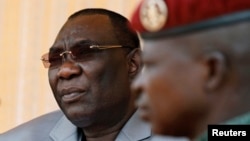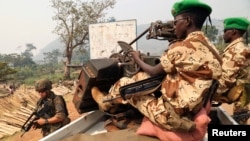BANGUI, CAR —
The International Organization for Migration is evacuating stranded foreign nationals Saturday from the Central African Republic, following appeals from neighboring African countries.
The airlift comes after the resignations of President Michel Djotodia and Prime Minister Nicolas Tiengaye Friday at the end of a two-day summit in Chad by leaders of the Economic Community of Central African States (ECCAS).
ECCAS leaders said talks will be held in Bangui, the CAR capital, to decide the country's new leadership. The announcement follows months of deadly sectarian violence.
The first three IOM charter flights in the coming days will repatriate about 800 Chadians from war-torn Bangui to Chad's capital, N'Djamena. The 800 are part of a group of 2,500 Chadians sheltering in a transit camp adjacent to Bangui airport, living in miserable conditions at the overcrowded and unsanitary site.
News of the president's resignation was greeted by joyous street celebrations in Bangui. "Djotodia's resigned!' shouted one girl. Cheers, blaring car horn and gun shots fired in the air could be heard throughout the capital.
The president's resignation came after an extraordinary call Thursday by the summit for the entire transitional parliament in Bangui to board a plane and fly to N'Djamena.
When they arrived they were summoned to intensive talks, which carried on until nearly 4 a.m. Friday. It is understood the talks were aimed at persuading the parliament, which includes Djotodia supporters as well as opponents, to agree that he should step aside.
A former minister in a previous CAR government, Gaston Mandata, said in an interview that he agreed with the resignation of the interim president.
Djotodia, as well as the Prime Minister Nicholas Tiangaye have shown their limitations when it comes to managing the transition, Mandata said, adding that the two now former leaders have shown serious incompetence and a lack of capacity to handle the crisis and the transition successfully.
The CAR state has virtually collapsed since Djotodia came to power in March 2013 on the back of a rebellion by the Seleka alliance, whose fighters are accused by Human Rights Watch of many atrocities.
A cycle of sectarian violence between Muslim and Christian militias peaked in December when at least 750 people were killed in Bangui, and others died outside the capital.
Mandata blames Djotodia for much of the chaos, saying Seleka rebels have looted, raped ans stolen since they took over Bangui in Decemeber 2012. And he said the Seleka leader, Djotodia, allowed them to do it.
But he repeatedly denied responsibility for Seleka abuses and blamed his predecessor, Francois Bozize, for the instability.
Some observers have suggested that Seleka fighters were taking revenge for atrocities committed by previous governments, particularly in the northeast of the country.
Central African Republic's transitional parliament is likely to choose another interim president to serve through national elections, which could possibly be held later this year.
A Catholic priest, Abbe Albert Tungumale-Baba, says his church in Bangui is currently sheltering hundreds of people who have fled violence. He said Central Africans need to be wary of influence from N'djamena, the Chadian capital.
Central Africans believe that Chad and the Chadian president, Idriss Deby, have been involved in the operations that led to the current situation, the priest said. He believes regional leaders must meet and discuss and seek solutions, but there also is a need for truthful, sincere discussions.
Chadian President Idriss Deby told the summit that the CAR had been plunged into the tragedy of war by its own children.
According to former CAR minister Mandata, there are fears the Seleka might try to force a breakaway or secession in northern parts of the country, where there is oil. He called on Chad not to support the Seleka.
The airlift comes after the resignations of President Michel Djotodia and Prime Minister Nicolas Tiengaye Friday at the end of a two-day summit in Chad by leaders of the Economic Community of Central African States (ECCAS).
ECCAS leaders said talks will be held in Bangui, the CAR capital, to decide the country's new leadership. The announcement follows months of deadly sectarian violence.
The first three IOM charter flights in the coming days will repatriate about 800 Chadians from war-torn Bangui to Chad's capital, N'Djamena. The 800 are part of a group of 2,500 Chadians sheltering in a transit camp adjacent to Bangui airport, living in miserable conditions at the overcrowded and unsanitary site.
News of the president's resignation was greeted by joyous street celebrations in Bangui. "Djotodia's resigned!' shouted one girl. Cheers, blaring car horn and gun shots fired in the air could be heard throughout the capital.
The president's resignation came after an extraordinary call Thursday by the summit for the entire transitional parliament in Bangui to board a plane and fly to N'Djamena.
When they arrived they were summoned to intensive talks, which carried on until nearly 4 a.m. Friday. It is understood the talks were aimed at persuading the parliament, which includes Djotodia supporters as well as opponents, to agree that he should step aside.
Michel Djotodia
Michel Djotodia- Seized power from Francois Bozize in March 2013
- First Muslim leader of Christian majority Central African Republic
- Involved in several rebel groups, including Seleka
- Studied in the Soviet Union in the 1970s
- Served as diplomat in Sudan
- Born in 1949 in northeastern Vakaga region
A former minister in a previous CAR government, Gaston Mandata, said in an interview that he agreed with the resignation of the interim president.
Djotodia, as well as the Prime Minister Nicholas Tiangaye have shown their limitations when it comes to managing the transition, Mandata said, adding that the two now former leaders have shown serious incompetence and a lack of capacity to handle the crisis and the transition successfully.
The CAR state has virtually collapsed since Djotodia came to power in March 2013 on the back of a rebellion by the Seleka alliance, whose fighters are accused by Human Rights Watch of many atrocities.
A cycle of sectarian violence between Muslim and Christian militias peaked in December when at least 750 people were killed in Bangui, and others died outside the capital.
Mandata blames Djotodia for much of the chaos, saying Seleka rebels have looted, raped ans stolen since they took over Bangui in Decemeber 2012. And he said the Seleka leader, Djotodia, allowed them to do it.
But he repeatedly denied responsibility for Seleka abuses and blamed his predecessor, Francois Bozize, for the instability.
Some observers have suggested that Seleka fighters were taking revenge for atrocities committed by previous governments, particularly in the northeast of the country.
Central African Republic's transitional parliament is likely to choose another interim president to serve through national elections, which could possibly be held later this year.
A Catholic priest, Abbe Albert Tungumale-Baba, says his church in Bangui is currently sheltering hundreds of people who have fled violence. He said Central Africans need to be wary of influence from N'djamena, the Chadian capital.
Central Africans believe that Chad and the Chadian president, Idriss Deby, have been involved in the operations that led to the current situation, the priest said. He believes regional leaders must meet and discuss and seek solutions, but there also is a need for truthful, sincere discussions.
Chadian President Idriss Deby told the summit that the CAR had been plunged into the tragedy of war by its own children.
According to former CAR minister Mandata, there are fears the Seleka might try to force a breakaway or secession in northern parts of the country, where there is oil. He called on Chad not to support the Seleka.





